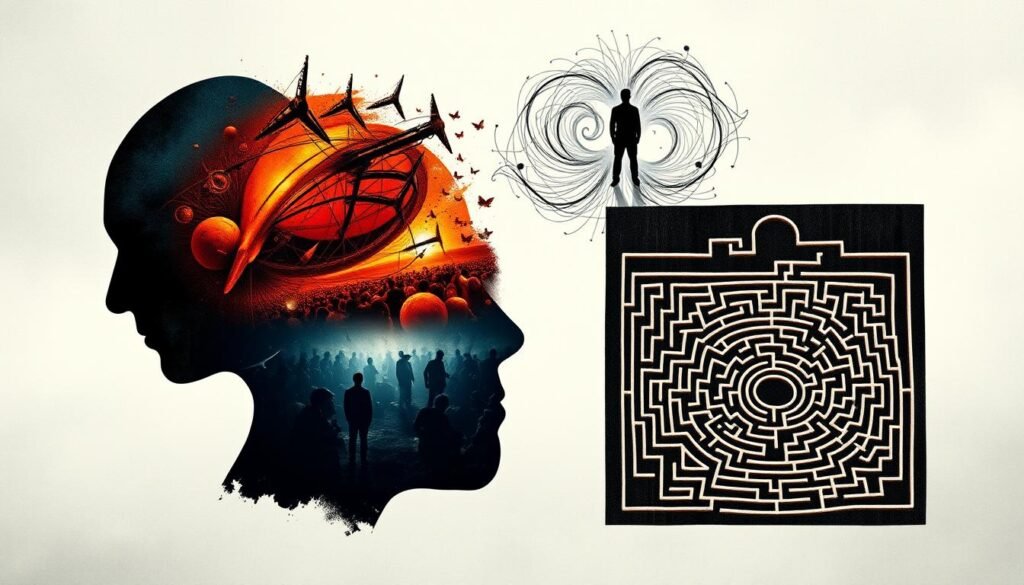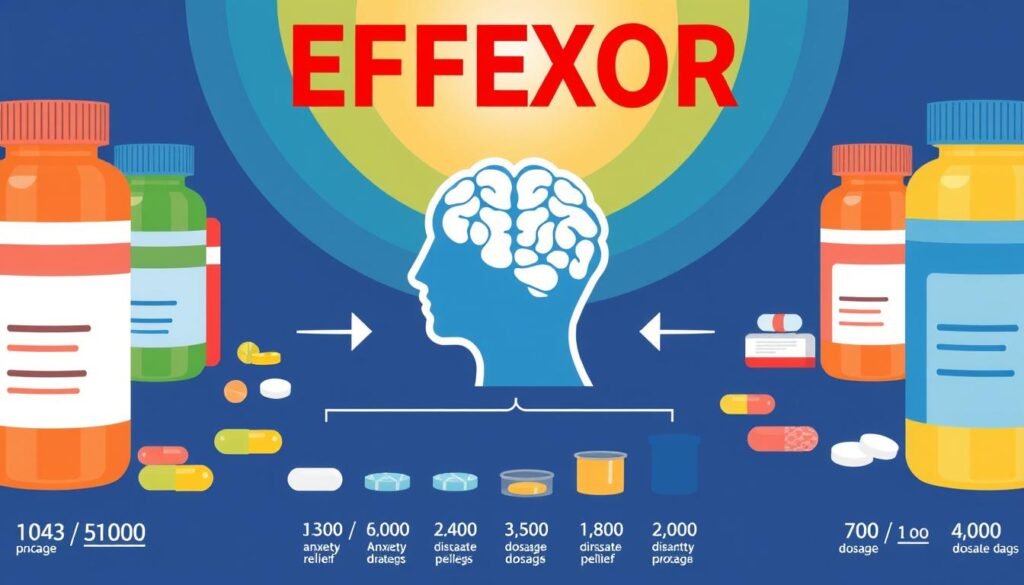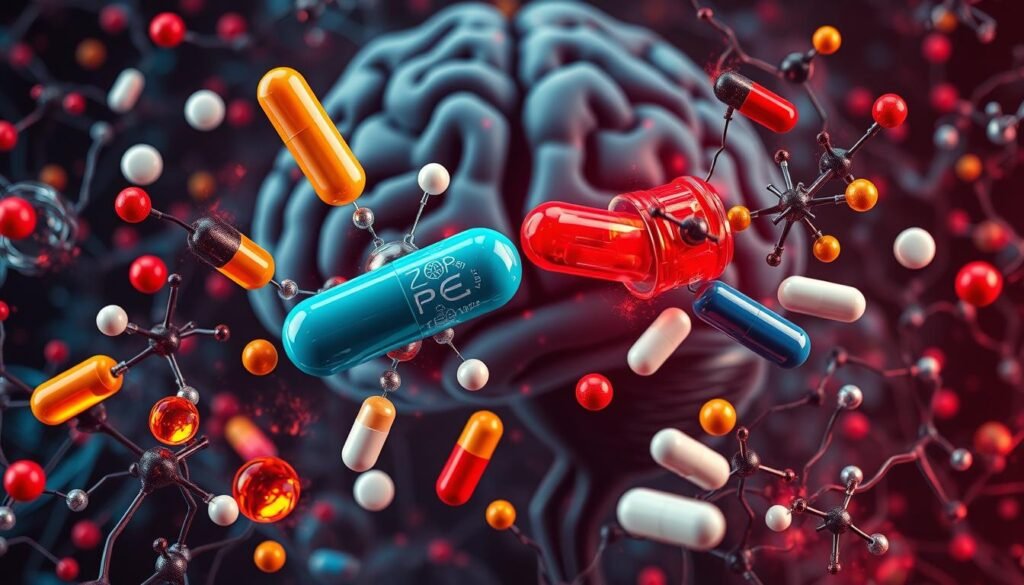Did you know over 30% of adults in the United States will face an anxiety disorder at some point? This fact drives home the critical need for strong treatment choices. Effexor, or venlafaxine, stands out as one of those options. It’s an SNRI antidepressant, helping control mood by boosting neurotransmitters like serotonin and norepinephrine. This piece explains how Effexor tackles anxiety, its benefits, and what to consider if you’re looking into treatments.
Key Takeaways
- Effexor is an effective treatment for anxiety disorders and depression.
- It works by increasing serotonin and norepinephrine levels in the brain.
- Patients may take several weeks to notice symptom improvements.
- Common side effects include anxiety and nausea, while serious ones require immediate medical attention.
- Monitoring blood pressure is crucial, as Effexor may cause an increase.
- Patients should avoid alcohol during treatment to prevent complications.
- Over 30% of adults may face anxiety disorders, underscoring the need for effective treatments like Effexor.
Introduction to Effexor (Venlafaxine)
Effexor (venlafaxine) is a top antidepressant medication for people dealing with anxiety and depression. The FDA has approved this drug for various conditions, like generalized anxiety disorder and panic disorder. In the United States, over 30% of adults might face an anxiety disorder, so knowing about Effexor is important for overall care.
The story of Effexor introduction tells us how it affects anxiety treatment. It works by changing levels of serotonin, norepinephrine, and dopamine. These chemicals are key for mood control, helpful for those dealing with anxiety and depression. Effexor was first given out in 1993 in America and is now a top-antidepressant medication.
Effexor is essential for healthcare providers looking for effective treatments. Learning about its benefits and side effects, along with other treatment options, is key. This knowledge helps people better manage anxiety disorders.
| Condition Treated | Medication | Typical Starting Dose (mg) | Maximum Dose (mg) |
|---|---|---|---|
| Generalized Anxiety Disorder | Effexor (Venlafaxine) | 75 | 225 |
| Panic Disorder | Effexor (Venlafaxine) | 75 | 225 |
| Social Anxiety Disorder | Effexor (Venlafaxine) | 75 | 225 |
| Major Depressive Disorder | Effexor (Venlafaxine) | 75 | 225 |
Talking to healthcare providers about Effexor helps people find the right anxiety treatment for them. For more info on anti-anxiety meds, visit this resource.
What is Effexor (Venlafaxine)?
Effexor is also called venlafaxine. It’s an antidepressant medication used mainly for anxiety issues. These include Generalized Anxiety Disorder (GAD), Panic Disorder, and Social Anxiety Disorder. Effexor is part of the SNRIs group, which helps increase serotonin and norepinephrine in the brain. These chemicals are key for mood and energy, helping reduce anxiety symptoms.
This medication comes in different forms and strengths. You can find extended-release tablets in 37.5 mg, 75 mg, 150 mg, and 225 mg. Immediate-release tablets come in doses like 25 mg, 37.5 mg, 50 mg, 75 mg, and 100 mg. The brand names are Effexor® for immediate-release and Effexor XR® for extended-release capsules.
Venlafaxine is also approved for major depressive disorder (MDD). Sometimes doctors prescribe it for other conditions, such as ADHD, migraine prevention, and PTSD.
| Formulation | Dosage Options |
|---|---|
| Immediate-release pills | 25 mg, 37.5 mg, 50 mg, 75 mg, 100 mg |
| Extended-release tablets | 37.5 mg, 75 mg, 150 mg, 225 mg |
| Brand Name: Effexor | Immediate-release tablets |
| Brand Name: Effexor XR | Extended-release capsules (37.5 mg, 75 mg, 150 mg) |
Knowing about Effexor helps those looking into anxiety treatment options. It shows the impact of drug advancements on improving lives through treatment.
How Effexor (Venlafaxine) Works for Anxiety
Effexor is known as a serotonin-norepinephrine reuptake inhibitor (SNRI). It works by boosting serotonin and norepinephrine in the brain. This process helps control mood and lower anxiety.
Mechanism of Action: Serotonin and Norepinephrine Regulation
Effexor creates a balance between serotonin and norepinephrine. This balance is key to feeling well. It corrects the chemical imbalances linked to anxiety. Over time, it stabilizes mood and eases worry and tension.
Effect on Anxiety Symptoms
Effexor’s effect on anxiety includes improving mental focus, reducing restlessness, and lowering overall anxiety. Most users feel emotionally balanced after four to six weeks. Some may experience side effects like nausea or headaches at first, but these issues generally go away.
| Neurotransmitter | Function | Effect of Effexor |
|---|---|---|
| Serotonin | Affects mood and anxiety regulation | Increased levels contribute to improved mood and reduced anxiety |
| Norepinephrine | Regulates alertness and energy levels | Enhanced levels facilitate better responses to stress and anxiety |
Types of Anxiety Disorders Treated by Effexor
Effexor is a great choice for those facing different kinds of anxiety. It helps with specific anxiety issues, giving people back control of their lives. Knowing which anxiety disorders Effexor can treat is vital for anyone looking into GAD treatment or how to manage their anxiety.
Generalized Anxiety Disorder (GAD)
Generalized Anxiety Disorder (GAD) means having ongoing and extreme worry about many parts of life. It affects about 1 in 3 people diagnosed. More young people are facing this issue today. Effexor is effective in treating GAD, easing long-term anxiety, and improving well-being.
Panic Disorder
Panic Disorder is about having sudden panic attacks that bring fear and discomfort. Those with it may always worry about another attack happening. This worry can greatly affect their life. Effexor helps by making these panic attacks less common and less severe, which brings more calmness.
Social Anxiety Disorder
Social Anxiety Disorder is when someone is extremely scared of social events and being around people. They fear judgment or feeling embarrassed in front of others. Effexor can help a lot with social anxiety, making it easier for people to be part of social activities.

The Benefits of Effexor in Anxiety Treatment
Effexor, or venlafaxine, helps people with anxiety disorders. It works by changing serotonin and norepinephrine levels in the brain. This improves mood and lowers anxiety. Many patients see their anxiety symptoms get better in both the short and long term.
Improvement in Symptoms
Effexor mainly reduces anxiety symptoms. Patients notice they can do daily activities easier and feel more emotionally stable. The effects are usually seen in a few weeks. This makes Effexor a solid choice for anyone looking to get a handle on anxiety.
Long-term Effects and Efficacy
Studies show Effexor’s long-term benefits in treating anxiety continue over time. It helps people manage their anxiety well for long periods. Its ability to keep symptoms at bay makes it a key treatment option.
Dosage Guidelines for Effexor
Knowing how much Effexor to take is key for it to work right. This medicine, especially the type that works over time, needs careful dose changes. These changes are based on how each person reacts to it. It’s key to start with the advised dose and talk to a doctor about any dose changes needed.
Starting Dose Recommendations
The usual first dose of Effexor XR depends on the anxiety or depression being treated. Below are the typical starting points:
| Condition | Starting Dosage | Maximum Dosage |
|---|---|---|
| Major Depressive Disorder | 37.5–75 mg daily | 225 mg daily |
| Panic Disorder | 37.5 mg daily | 225 mg daily |
| Social Anxiety Disorder | 75 mg daily | 75 mg daily |
| Generalized Anxiety Disorder | 37.5–75 mg daily | 225 mg daily |
Adjustments Based on Response
Doctors will adjust the medication based on how well it works and if it’s well-tolerated. They consider:
- The kind and seriousness of the condition
- How the patient responded to the first treatment
- The health of the kidneys and liver
- Any other health issues or medicines being taken
Regular check-ups help get the dosage just right and lower side effect risks. If a dose is missed, doubling up the next dose isn’t the answer. This could increase risk without need.

Potential Side Effects of Effexor
Knowing the potential side effects of Effexor (venlafaxine) is key for anyone starting this anxiety and depression medication. While Effexor works fine for many, being aware of the side effects helps you talk better with your doctor.
Common Side Effects
Effexor might cause some common side effects when you first start taking it. People often feel:
- Nausea
- Dizziness
- Dry mouth
- Increased sweating
- Feeling unusually tired or weak
- Changes in appetite
- Headaches
- Problems with sleep, including insomnia or excessive sleepiness
These common side effects appear in more than 1 in 100 people. Usually, these effects get better over time.
Serious Side Effects to Monitor
Although most people handle Effexor well, there are serious side effects to watch out for. You need immediate doctor help if you notice:
- Increased blood pressure, leading to headaches and chest pain
- Suicidal thoughts or actions, especially in young people
- Symptoms of serotonin syndrome, like confusion and seizures
- Severe allergic reactions, with swelling and trouble breathing
- Lung issues, marked by a dry cough and breathing problems
- Hyponatremia, seen mainly in older people or those on certain meds
Serious side effects are rare, affecting fewer than 1 in 100 patients. Being alert to these problems is important for safe treatment.
Drug Interactions with Effexor
Effexor (venlafaxine) can interact badly with many medications. This can lead to serious problems. It’s very important for anyone using Effexor to understand how other drugs can affect it. You should be careful about which medicines you use at the same time. Mixing Effexor with certain drugs can increase risks and cause bad side effects.
Medications to Avoid
When on Effexor, you should stay away from some specific medicines. Mixing it with monoamine oxidase inhibitors (MAOIs) can make serotonin levels shoot up. This can cause serotonin syndrome, which is dangerous. Stay clear of the following:
- Metoprolol: It may affect how well it lowers blood pressure.
- Haloperidol: Levels might rise, making side effects more likely.
- Blood thinners and NSAIDs: They could make bleeding more likely.
- St. John’s wort: This raises the risk of serotonin syndrome.
- Other antidepressants: These can push serotonin levels too high.
Importance of Informing Healthcare Providers
To avoid problems from Effexor drug interactions, tell your doctors about everything you’re taking. This includes all medicines and supplements. Listing them helps your healthcare team watch for interactions. You should include:
- Prescription medications
- Over-the-counter drugs
- Herbal supplements
Talking with your doctor before you start or change any medicine is crucial. It keeps you safe and makes sure your treatment works well. Click here to learn more about talking to your doctor about drug interactions.

Patient Experiences and Efficacy Studies
Studying the effectiveness of Effexor for anxiety includes both clinical research and patient stories. Many studies back up the drug’s benefits. When looking at patient results, their stories highlight Effexor’s impact on their lives.
Clinical Research Findings
Studies show Effexor helps those with anxiety disorders. It’s found that venlafaxine, especially the extended-release, lessens anxiety and depression. A study noted patients experienced reduced symptoms after receiving Effexor. This is crucial because more than 25% might face anxiety disorders in their lifetime.
Positive clinical outcomes match patient feedback. Many report significant improvements in their condition. This suggests a better life quality for those who respond well to treatment. Clinical studies like these highlight the value of effective treatments.
Real-life Patient Testimonials
Patients’ real stories highlight Effexor’s benefits. They talk about better anxiety management. Here are common points they make:
- They feel less anxious and more involved in life
- They experience better mental health and emotional balance
- They handle stress much better than before
Many are thankful for the vital changes Effexor brought to their lives. The mix of clinical facts and real stories makes a strong case for Effexor. It shows the drug as a key option for tackling anxiety, supported by research and real-world outcomes.
Alternatives to Effexor for Anxiety Treatment
Looking into other options besides Effexor for anxiety can give patients more choices. These options can better fit their unique needs. Even though Effexor (venlafaxine) is a common choice for generalized anxiety disorder, panic disorder, and social anxiety, there are other effective medications available.
SSRIs vs. SNRIs
SSRIs (Selective serotonin reuptake inhibitors) and SNRIs (serotonin-norepinephrine reuptake inhibitors) are key in treating depression and anxiety. SSRIs like Zoloft (sertraline) and Prozac (fluoxetine) mainly focus on the brain’s serotonin levels. This action makes them good for treating various anxiety disorders. On the other hand, SNRIs, such as Effexor and Cymbalta (duloxetine), target both serotonin and norepinephrine. This provides a wider method of tackling anxiety.
The starting dose for SSRIs is usually lower than for SNRIs. For example, Zoloft often starts at 50 mg, and Effexor at 75 mg. Also, insurance typically covers both medication types, but the costs can differ a lot.
Other Medication Options
Those looking for something other than Effexor might think about tricyclic antidepressants or benzodiazepines. Tricyclics used to be the go-to for anxiety treatment and can still help, but they have different side effects. Benzodiazepines work quickly to ease acute anxiety. However, they have a dependency risk and are usually for short-term use.
| Medication Type | Examples | Common Uses | Typical Dosage |
|---|---|---|---|
| SSRIs | Zoloft, Prozac | Generalized anxiety disorder, panic disorder | 50 mg (Zoloft), 20 mg (Prozac) |
| SNRIs | Effexor, Cymbalta | Generalized anxiety disorder, social anxiety disorder | 75 mg (Effexor), 30 mg (Cymbalta) |
| Tricyclics | Amitriptyline, Clomipramine | Various anxiety disorders | 25-150 mg |
| Benzodiazepines | Ativan, Xanax | Acute anxiety relief | 0.5-2 mg (Ativan), 0.25-4 mg (Xanax) |
Taking Effexor Safely
Understanding how to take Effexor (Venlafaxine) safely is key. Patients must follow guidelines for the best outcome without risk. This helps them get all benefits and avoid health problems.
Monitoring Blood Pressure
Keeping an eye on blood pressure is important with Effexor. Checking it regularly can catch any big changes early. It’s very important for those with health issues or anyone new to the medication.
Your doctor will suggest routine checks. This ensures your blood pressure stays steady.
Consumption of Alcohol and Other Substances
While on Effexor, avoid alcohol. It can make side effects worse, like making you sleepy and slowing your thinking. Knowing what to steer clear of during treatment makes it safer.
For more info on Effexor, check out this detailed resource: this guide.
What to Expect When Starting Effexor
Starting Effexor can greatly help those with anxiety. It’s key to know what this journey entails for patients and their supporters. How and when the medication is taken are crucial to its success.
Timeline for Symptom Improvement
Improvements may appear in the first few weeks of taking Effexor. But it often takes 4 to 8 weeks to see full benefits. During this time, one might feel more energetic, have a better mood, and sleep well. Remember, everyone’s experience is different, so patience is key.
Importance of Consistent Usage
Taking Effexor consistently is crucial for its effectiveness. Stick to the schedule your doctor recommends. Skipping doses or changing the regimen on your own can set you back. Keeping in touch with your doctor is important to track progress and deal with any issues.
Long-term Treatment Considerations with Effexor
When thinking about long-term Effexor use, it’s key to weigh its pros against the cons. Many start taking Effexor hoping to control their anxiety and depression. The time they stay on it can vary, with some using it for many months or years.
Duration of Treatment
The time you need Effexor can differ from person to person. Some might use it long-term, while others check in with their doctors to see if it’s still needed. It’s important to keep checking in to make sure it’s working and not causing side effects. Studies show Effexor can help a lot, but if used for a long time, there might be risks like heart issues and brain changes. Regular doctor visits ensure the treatment is still the best option.
Tapering Off the Medication
Quitting Effexor should be done carefully to avoid withdrawal. Withdrawal can make someone feel depressed, anxious, and physically unwell. Doing it under a doctor’s guidance can ease these issues. Always talk to your healthcare provider when stopping Effexor to make it as smooth as possible.
Conclusion
Effexor, known as venlafaxine, is key for treating anxiety disorders. It’s a serotonin-norepinephrine reuptake inhibitor (SNRI). This makes it good at managing mood and anxiety.
It helps with generalized anxiety disorder, social anxiety, and panic disorder. This improves life quality for many people.
Effexor’s effectiveness isn’t just for anxiety. It also helps with chronic pain and sleep. Working with doctors is important to balance its benefits against any risks.
To sum it up, Effexor is a strong option for treating anxiety. Knowing how it works helps people make better health choices. It’s vital for managing anxiety well, alone or with other treatments.